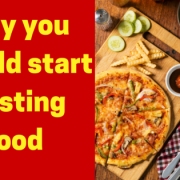
Read Time [5 minutes]
I know the title and graphic of today’s post might draw some controversy so I’ll just come out and say that I don’t advocate buying a lot of food with the intention of throwing it in the trash.
Whew. Now that that’s out of the way, let me start with a quick story.
Last week, my wife and I were getting ready for a trip to California to celebrate the wedding of my brother-in-law. While we were packing, we took a lot of the left over food that was likely to spoil while we were away and made a mish-mashed dinner out of it.
We heated up some left over chicken, cut up some tomatoes, avocados, and had some mango for dessert. About halfway through the meal, I was pretty full and ready to turn in. Even though we’ve had a similar discussion about wasted food in the past, my wife was dismayed at the half-plate of avocado and tomato that was still sitting on the table because it was going to go to waste.
To which I replied:

Our parents used to say that there are starving kids in Africa that would love to have the food you are going to put to waste. But here’s the truth. Eating that extra serving does nothing to serve people that are starving, and it harms you by putting that wasted food into your fat cells by overeating.
If we really want to solve this problem of wasted food, we have to solve the real problem that Americans have which is overconsumption.
Overconsumption Begets More Overconsumption
There’s a bug that’s been embedded into our brains that was programmed by our parents, who were programmed by our grandparents that lived through the Great Depression. The economy was wrecked and it was difficult to predict when, where, and how large your next meal was going to be.
So we learned things like:
- Clean up your plate
- Don’t let your food go to waste
- Just have a little bit more, we are almost finished
So while we are children, we get trained at an early age to ignore our brain’s fullness signal and push our ability to take on more food.
There’s a major problem with that. Your brain and body are extremely adaptable. When you expose your body to a stress, your body will respond by creating a situation to handle that stress better next time. It’s the principle behind lifting weights. When you force your muscles to lift something heavy, you create tears that makes your body develop stronger muscle tissue to lift heavier weight.
When you train your body to overeat, the stress of overeating will force your body increase the amount of food it can handle before the brain gives the full signal next time. That’s how these competitive eaters train their bodies to take on such ludicrous amounts of food.

Joey Chestnut – Legendary Hot Dog eater
And I don’t care if that food was consumed. If we see food as an object of sustenance, then you can’t convince me that 67 of those 69 hot dogs didn’t go to waste in the name of voyeuristic gluttony.
The problem with wasting food in this way is that the waste of overeating creates sickness in the human body.
Sometimes getting command of our eating patterns means that we have to say no to the remaining food on our plate when we know we don’t need to eat it.
Dealing With Overconsumption
I don’t advocate just throwing away massive amounts of food. I think we should eat all of our food when we are eating, but we have to do a better job of making sure we have a lot less food on our plates.
We all know that overeating is a problem embedded in our culture. If we want to create change in our consumption patterns, we have to have a change in the programmed ideas that helped raise us. Here are some of my thoughts that helped change my mind on overeating.
- Eating 3 meals per day is a construct of ritual, not necessity. If you had a big lunch and are not hungry at dinner, you can sit and enjoy your family’s company while passing on the meal. There’s no textbook in human physiology that says that you must eat sometime between 6pm – 8pm in order to be alive and healthy.
- Sometimes it’s easier mentally to not eat, than to eat a light meal. I periodically fast from time to time, and honestly find it easier to not eat for an entire day, than to eat small bland meals that I don’t enjoy. Fasting also changes your mentality about food and hunger by giving you a sense of control over your eating habits.
- Learn to eat till you’re not hungry as opposed to eating until you’re full. This one thought when it finally hit me on a visceral level changed everything for me.
- The human body has natural defenses against starvation. You can live for weeks with minimal food because your body will manage your energy usage.
However, your body has almost no defense against overeating.
We can get lost in the shuffle of low fat, fight fat, low carb diets, but none of it matters if we don’t change some of our deeply held beliefs about how we eat. What do you all think?











